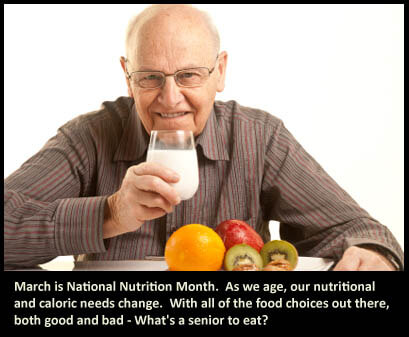Celebrating National Nutrition Month by Asking - What's A Senior To Eat?

Summary: Regina reminds us that it is National Nutrition Month and that seniors are also faced with a myriad of food choices. Seniors are different from the younger population in many ways in terms of nutritional needs and daily calories. Did you know, there is a Food Guide Pyramid specifically for older adults? So, what’s a senior to eat, or not eat?
Author: Regina Woodard exclusively for Assisted Living Directory
Regina is a regular contributor to Assisted Living Directory

Itnot a secret that we in the US have a big problem with weight; nearly two-thirds of adults in the United States are overweight, with childhood obesity growing as well. The growing statistics of children and adults growing in weight has drawn focus on what can be done in order to curb this dangerous trend.
March is National Nutrition Month and ita good time to look into how your food choices affect your body. This is especially true if you are in your elder years; the older we become, the more we have to keep a hold on the choices we make when it comes to the food we eat. For seniors, illnesses and diseases have a higher consequence eating too much salt can help to increase high blood pressure, while a lack of calcium can speed up the advancement of osteoporosis. High fat diets can even help to contribute to some cancers.
So what can seniors and their families do to ensure more years to follow?
As with the new move towards eating healthier, seniors should take stock of what foods can help or hurt them. Often times, a senior may not be as active as they once were, which means that they dont need to have as many calories as they once did. But that doesnt mean you can replace the carrots with Cheetos. Maintaining a healthy diet is important to seniors, helping you to live longer, stronger, mentally sharp and feeling better.
If a senior isnt active and therefore doesnt need as many calories, just how many do they need then? The first step is to ask your primary care doctor or home health nurse as to what you need, based on your level of activity women over fifty can have between 1600 and 2000 calories a day, while men over fifty should be able to have between 2000 and 2800 calories.
Due to the inclusion of the Older Adults waiver, individuals may need to be at least 50 years of age, with different criteria for those who are either on or seeking Medicaid financially, the income base is still the same, but individuals and families have three options to qualify:
Again, itimportant to ask a physician as to the exact amounts, as they can range based on age, gender, height, and current weight.
As with any age, the famous food pyramid will come in and point you in the right direction (See a modified Food Pyramid for Older Adults done by Tufts University). Fruit and vegetables are still an important facet of maintaining a healthy diet; berries, apple, bananas, and melons are a good source of proteins and nutrients and you should strive to eat one or two servings each day. Calcium is also a needed source for maintaining bone health, especially in the later years of life; seniors should get about 1200mg of calcium every day, from either cheese, milk, or yogurt. Even though dairy is a good source for calcium, there are other sources including kale, almonds, and tofu, which is great for those who might be lactose intolerant.
Grains, proteins, and vitamins are also important for a healthy life in the later years.
Water, something that doctors recommend having several times a day, is important for seniors too. The reduction of fluid levels in the body can cause seniors to be prone to dehydration and for those seniors who live in hot areas, itextremely important to keep hydrated in order to avoid UTIs, constipation, and confusion.
Now that you have some idea of how seniors should consider eating, here are some things that seniors should be avoiding. As mentioned above, salt (sodium) intakes are okay, but dont take it to the extreme eating too much can lead to water retention and high blood pressure. Carbohydrates, which can be found in grains, fruits, veggies, and beans, are important to the body, but make sure that youre choosing the good carbs and not the bad ones.
What are bad carbs? Those likes white flour, refined sugar, white rice, and anything that might have been stripped of bran, fiber, and nutrients can help spike blood sugar levels and are only good for short-term energy. And speaking of sugar, it seems as though therenothing edible that doesnt have it. You can certainly avoid it, but it doesnt mean you can never have it, however moderation is the key.
Sugar can be found in bread, canned soups, pasta sauces, frozen dinners, fast foods, ketchup, cereals, and more. How do you avoid sugar when iteverywhere? As with sodium and bad carbs, itextremely important to check the labels, even on your favorite foods. Even the slightest change such as going for sugar free versions can help to reduce issues later on. The nutrition label on foods can help with the decision of whether to buy it or put it back.
Nutrition isn’t the only way to stay healthy. Often, life changes can sometimes place seniors in isolation, whether it be living in a house without their beloved spouse or living on their own and away from family and friends, these changes can also affect a seniordietary needs. Itnot uncommon for seniors to experience loneliness and depression, especially after the death of their spouse or another loved one, and this can cause a lack of eating.
In these cases, itimportant that a senior is around family and friends to support them and making sure that they are eating well and living well. If a senior is living in an assisted community, itimportant for family members to visit; depending on the community, seniors should be able to get involved in the communityactivities. Some communities will have arts and crafts, daily or weekly outings, as well as group get togethers for residents.
For those seniors living in assisted living homes or facilities, many of them now employ talented chefs who can accommodate special diets, and who are specifically trained to cater to the specific dietary needs of seniors.
Additionally, each city, state and area of the US is covered by a local Area Agency on Aging. These agencies often times have nutrition and meal programs for seniors – and even meal delivery services to assist frail or homebound seniors living at home.
Maintaining a healthy life style isnt just for those under fifty; those over the age of fifty can benefit from taking care of themselves and ensuring that they can continue their remarkable lives.
Copyright © 2012 by Regina Woodard
Article by Regina Woodard exclusively for Assisted Living Directory
No Obligation
Assisted Living with Celebrating National Nutrition Month by Asking - What's A Senior To Eat?


